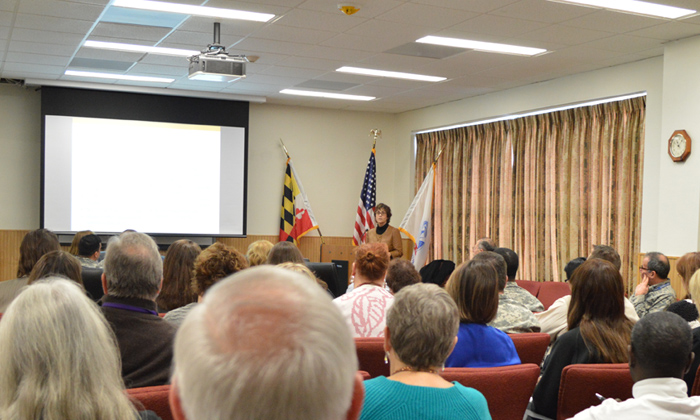USAMMDA Hosts Regulatory Intelligence Seminar

The U.S. Army Medical Materiel Development Activity is hosting Regulatory Intelligence Seminar that consists of seven sessions. The series began in January and will end in August.
So what exactly is regulatory intelligence and why is it important to the U.S. Army Medical Research and Materiel Command?
Regulatory intelligence is the process of continually gathering, understanding and sharing the most up-to-date information put out by the U.S. Food and Drug Administration for the medical pharmaceutical and device approval process.
"The regulatory environment is always changing," said Dr. Carrie Laurencot, senior regulatory affairs advisor at USAMMDA. "It is important to always have our people aware of changes made to policies and guidelines that would affect medical product development strategy."
This seminar series offers product managers, scientists and regulatory professionals a unique insight into the relatively new and evolving regulatory world, including clinical trials, policies, reporting and submissions for licensure.
"The production, testing and manufacture of medical products are regulated in part though information provided by various governmental agencies," said Dr. Dave Green, supervisory toxicologist, Division of Vaccine and Related Product Applications, Office of Vaccine Research and Review, Center for Biologics Evaluation and Research, FDA and FDA liaison at USAMMDA. "The aim of regulatory intelligence is to increase the efficiency and effectiveness of developmental efforts and reduce the expenditure of resources particularly of time and cost."
The seven sessions in the seminar will feature experts from various fields in the regulatory community, presenting on various aspects concerning scientific and regulatory functions in the development of drugs, vaccines, biologicals and devices.
"The establishment of a professional regulatory seminar series provides a venue to bring together regulatory scientists from around the USAMRMC command to discuss guidelines and recommendations by the FDA," said Laurencot.
This seminar series can be attended in person or by live-stream by personnel around the world at USAMRMC, Fort Detrick, the National Institute of Health and various other partnering organizations.
"This seminar series represents part of the effort to maintain the high level of skill needed to develop medical products in a rapidly changing environment," said Green.
For more information and directions on attending the regulatory intelligence seminar, contact a USAMMDA representative at 301-619-8053.
| Date | Topic |
| Jan. 27 | Developing strategies in terms of aims, goals and objectives. Participating in a feedback loop with FDA. |
| Feb. 26 | The dynamic environment of laws, regulations and policy. Coming to grips with uncertainty in the process. |
| Apr. 29 | What really happens in regulatory meetings? Knowing how to prepare and survive. |
| May 14 | Differences between the Strategic and Tactical Development of Vaccines and Drugs. Examples and General Theory. The role of precedent. Understanding its importance and making it useful in the analysis and development of approaches to regulatory actions. |
| Jun. 11 | Due Diligence. What You Should Know or Don't Know and Why It May or May Not Matter. |
| Jul. 9 | The influence of structure and organization on FDA in terms of decision making. Differences among the reviewing divisions and offices. |
| Aug. 26 | Developing Options in the Development of FDA Regulated Products. Flexibility and Innovation. |
 An official website of the United States government
An official website of the United States government
 ) or https:// means you've safely connected to the .mil website. Share sensitive information only on official, secure websites.
) or https:// means you've safely connected to the .mil website. Share sensitive information only on official, secure websites.


